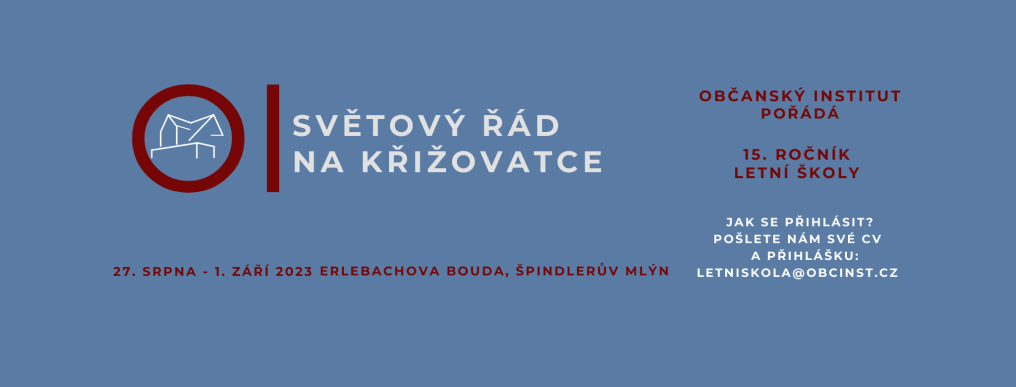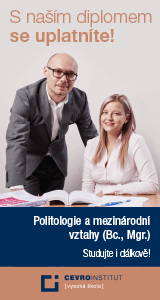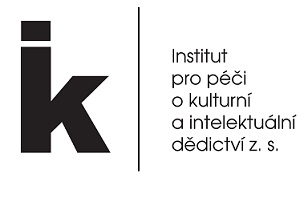MESSAGE FROM THE CHAIRMAN
A mere glance at the titles of Civic Institute´s Bulletins published in 1999 clearly demonstrates that the Civic Institute has not been neglecting any of the substantial issues in the life of man and society, neither of their interdependency. And rightly so, since the underlying predicate of conservative thinking, focused on the defense of freedom, makes us aware of the causal links between order (or disorder) in the human heart on the one hand, and order (or disorder) in society and the entire world on the other. One of the thinkers rooted in the conservative tradition made an acute observation precisely to this point: the less self-control people impose upon themselves, the more likely it is that they will be subjected to a lot tighter control from outside.
And yet, a random overview of articles, commentaries and programs in the mass media reveals a trend running straight in the opposite direction. The overriding assumption is that freedom can simply be taken for granted; the only perceived threat to our freedom comes, they say, from various breeds of zealots and harbingers of prejudice, always eager to subject modern man to a whole variety of moral restrictions, bans a taboos.
Nowadays it takes courage to firmly assert that freedom – unless it is associated with corresponding responsibility – is a self-destructive concept, whether in our personal lives or in society as a whole. For those who are brave enough to speak out and defend unpopular opinions in the interests of freedom, the Civic Institute provides a source of strength and an arsenal of arguments that will empower them to wage the crucial fight yet more effectively. And the fight is indeed heating up.
Our country is, or soon will be, experiencing a change of generations. An ever increasing role will be played by those with little or no recollection of the totalitarian era, and only of its terminal phase at that. The suffering of the past will no longer have the power to set their standards. For multiple reasons, the natural authority of people who actively fought against the tyrannies of the past has all but vanished, and likewise the influence of churches continues to fade away. What remains unchanged though – as has always been the case – is the need for generally accepted values and institutions which will revitalize the respect for all of the above. The Civic Institute is here to help anyone willing to take on their share of the task to be accomplished.
Pavel Bratinka
THE READING ROOM AND PUBLISHING ACTIVITIES
Long-term efforts to complement the Civic Institute´s library resources by additional publications have been under way ever since the library was established, and 1999 was no exception. Despite an increasing number of publications in Czech language which share the common ground with the Civic Institute in terms of choice of subjects and viewing them from a similar perspective, the bulk of the newly acquired volumes comes from abroad. In 1999 as in previous years, the Civic Institute was striving to fill the remaining gaps in the “classical” line of fundamental works of conservative and classical liberal thinking, and to further expand this core selection by a series of topical studies in a wide range of public policy areas, primarily from catalogs of American and West European institutions close to the Civic Institute.
1999 saw the completion of a three-year project sponsored by the American Donner Foundation, aimed not only at purchasing new books but also computerizing the library system. Thanks to this, the Civic Institute´s Reading Room has grown by several hundred new volumes and its electronic catalogization has been finalized, making it easier to search through the library resources right on the spot but also making it widely available over the Internet (http://sd.ruk.cuni.cz/tin-bin/oi/k6).
The choice of periodicals is no less attractive, primarily consisting of but not limited to those of an Anglo-American provenance. All of the most important conservative-oriented titles are available along with many others, such as National Review, The American Spectator, Chronicles, Crisis, First Things, Policy Review, The National Interest, The Public Interest, The American Enterprise, The Salisbury Review, Modern Age, Commentary, Foreign Affairs, The Economist, The American Journal of Economics and Sociology, Kultura, The Spectator, Imprimis, NATO Review, University Bookman, Humanitas, Thesis, W drodze and a lot more. The choice of domestic magazines includes Respekt weekly as well as Revue Prostor, Støední Evropa, Proglas, Politologický èasopis, Distance and Mezinárodní Report. Most of the above magazines are provided to the Civic Institute at no cost, thanks to generosity of their publishers.
The Civic Institute´s reading room is the right place to look for materials that are otherwise not so easy to get hold of in our local conditions but often are of an enormous value, released by international organizations similar in nature to the Civic Institute such as The Heritage Foundation, American Enterprise Institute for Public Policy Research, Cato Institute, Ludwig von Mises Institute, The Center for Security Policy, The Rutherford Institute, International Society for Individual Liberty, Atlas Economic Research Foundation or Acton Institute for the Study of Religion and Liberty, to name but a few.
The list of books published by the Civic Institute grew longer in 1999 by yet another title – Czech translation of Liberalism by John Gray. The book summarizes fundamental premises and historical development of political liberalism. The manner in which it treats the subject makes it a counterpart to Robert Nisbet´s Conservatism published in Czech in 1993.
Michaela Freiová´s activities, including the program “Family Values” which she coordinates, have gained considerable credit reaching beyond the borders of the Czech Republic. Therefore the Civic Institute published Freiová´s earlier work Underlying Premises of Family Policy in English. Reactions from readers abroad confirm that those lacking the personal experience of having lived under “practical socialism” are in urgent need of information that would mediate to them this particular type of experience, the main significance of which is to point to the high degree of alarming similarity between certain aspects of “family policy” in western democracies and the way these issues were approached by the communist state.
Civic Institute´s monthly Bulletin gave an opportunity to an ever increasing number of readers to get acquainted throughout the year with further texts by authors they are already familiar with, plus a few names appearing for the first time. The following twelve titles released in 1999 have brought the total number to one hundred:
No. 89
Barbara Hug: Government Intervention into Family
No. 90
Peter G. Peterson: Gray Dawn: The Global Aging Crisis
No. 91
Jaroslav Kuchyòa (ed.): The Russian Crisis of ´98 as Seen by Polish Experts
No. 92
Russell Kirk: Civilization Without Religion?
No. 93
Michael Farris: Homes Split Up
No. 94
Helmut Bärwald: The Damned Tenth Year
No. 95
Frank S. Meyer: Conservatism, Freedom and Western Civilization
No. 96
Alan S. Blinder: Eight Steps to a New Financial Order
No. 97
Vojtìch Cepl: Sources of Law – Principles or Interests?
No. 98
Russell Kirk: Alexis de Tocqueville
No. 99
Roman David: Communist Regime Illegitimity Act, or Legal Principles Recognized by Civilized Nations?
No. 100
Russell Kirk: The Conservative Mind
(quotes from the book of the same title)
Throughout the year, the Civic Institute representatives continued to voice their opinions on a variety of political issues and matters of public interest in dozens of topical commentaries run by some of the leading Czech daily newspapers (Mladá fronta Dnes, Lidové noviny, Nedìlní noviny, Právo) as well as other periodicals (Týden, Mosty), whereas broader texts transcending day-to-day issues of momentary significance appeared in Distance – a journal for critical thinking where two of the Civic Institute´s representatives are members of editorial boards.
Apart from journals and newspapers, opinions advocated by the Civic Institute staff members were also aired as part of radio and TV programs (Czech Television – Aréna, V pravé poledne, Snìží, Áèko; Czech Radio – Radiožurnál; Radio Free Europe; BBC; Radio Proglas). In the course of the year, Michaela Freiová – in addition to her activities in the Civic Institute – continued hosting Studio Kristián on Radio Proglas.
CONFERENCES, SEMINARS, LECTURES
Over the eight years of its existence, the Civic Institute´s regular seminar Christian Perspective and Free Society (known as KPSS) has been attended by more than 200 participants. The seminar was re-run again in 1999, once in the spring and once in the fall. Papers were presented by the same speakers as in the years before: Roman Joch, Michaela Freiová, Michal Semín and Jiøí Fuchs. Since the seminar is each year attended by new participants, the subjects remain the same: philosophical and ethical determination of freedom; natural law; critical review of relativism in values and of legal positivism; conservatism and liberalism; powers of the state in the life of society; subsidiarity; Christian foundations of civic society, and others.
Those who already took part in KPSS seminars in the past met again by the end of June 1999 in Svatý Jan pod Skalou to attend a four-day event focused on ethics and anthropology, entitled Who and What is a Human Being? The seminar started off with a debate between Professor Josef Šmajs of Brno University (“Evolutionary-Ontological Concept of Man”) and Jiøí Fuchs, a realist philosopher associated with the Civic Institute (“Does Man Have a Permanent Human Nature?”), after which Michal Semín argued against evolution in his paper “What Came First, the Chicken or the Egg?”, followed by “Dispute on Origins and Concept of Human Rights” between Roman Joch and opinion columnist Jan Jandourek. Ivona Holá then introduced Lutheran Roots of Nationalism and State Absolutism. The next day´s agenda opened with a discussion between Michaela Freiová and Jana Hradílková (Gender Studies) on the subject of feminism followed by a panel discussion chaired by MUDr. Dagmar Køížková and Michal Semín, entitled “Is Homosexuality Natural?” In the evening session, MUDr. Petr Pøíhoda spoke of his experience as an ethics tutor at the Medical School of Charles University and dealt with his students´ attitudes toward the said subject.
Who Represents the New Center in Europe? Such was the name of the seminar organized in mid-March by the Civic Institute in cooperation with the Prague chapter of Konrad-Adenauer-Stiftung. The first part consisted of papers presented by Roman Joch, Jan Holzer (political scientist from Brno) and Hans-Joachim Veen (German sociologist and head of KAS research and consultancy department). Second part was conceived as a debate between representatives of several Czech parliamentary political parties – Vladimír Mlynáø (Union of Freedom), Petr Neèas (Civic Democratic Party) and Cyril Svoboda (Christian Democratic Union – People´s Party) concerning the New Center Movement, chaired by journalists Jefim Fištejn and Bohumil Peèinka. Both parts of the seminar concluded with brief discussions giving the floor to other participants.
On invitation from the Czech Embassy in Poland, members of the Civic Institute paid a visit in May to Warsaw where, under the auspices of the Civic Institute, a seminar was held for diplomats from embassies of NATO member states under the title NATO and Kosovo in the Eyes of the New Member.
At the beginning of September, the Civic Institute organized a seminar in Teplá near Mariánské Láznì in cooperation with the Acton Institute for the Study of Religion and Liberty, entitled Toward a Free and Virtuous Society. In addition to speakers from the U.S. (Todd Flanders, P. Robert Sirico, John Wells) the event was also addressed by Michal Semín and Roman Joch of the Civic Institute. Compared to previous years, about 30 young people took part from a record number of 13 countries of America and Western, Eastern and Central Europe. This fact alone made the seminar a vivid event and positively contributed to informed if passionate debates on the role of Christianity in the realm of contemporary politics and market economy.
In November, Èeská køesanská akademie, Konrad Adenauer Stiftung and the Civic Institute co-organized a one-day conference Communism 10 Years After: Loss of Historical Memory? Historian Radka Lainová (School of Arts of Charles University) along with Stanislav Kokoška and Jiøí Kocian, representatives of the Institute of Contemporary History of the Czech Academy of Sciences, and director thereof Oldøich Tùma presented a historical analysis of communism and how it developed in the history of Czechoslovakia. The Anti-communist 3rd resistance was discussed by Stanislav Stránský, chairman of the Association of Political Prisoners; Stanislav Drobný, chairman of the Confederation of Political Prisoners; Vladimír Lopauk, chairman of the PTP Association; Supreme Court Justice Vojtìch Cepl; Karel Brückner, chief prosecutor of City of Prague; Adolf Rázek, representative of the Office for Documentation and Investigation of Crimes of Communism, and ex-spokesman thereof Tomáš Hornof. Jiøí Fuchs followed with a philosophical analysis of communism; Petr Fiala, head of Department of Political Science at Masaryk University School of Arts in Brno, commented on communism in terms of political science; sociological comments were presented by Klára Plecitá of the Sociological Institute of Czech Academy of Sciences and Viola Neu of the Konrad-Adenauer-Stiftung. Taking part in a heated political debate, chaired by Roman Joch and Jaromír Žegklitz, were Jan Ruml, chairman of Union of Freedom; Marek Benda, member of Czech Parliament for the Civic Democratic Party, and Petr Pithart, deputy speaker of the Senate. Delegates had an opportunity to sign a declaration calling on relevant state authorities to initiate investigation as to whether the existence of communist-oriented organizations complies with the Constitution of the Czech Republic. The conference met with significant interest: the number of attendees reached 300 and it was reported on by a number of journals and newspapers.
Before Christmas, the Civic Institute organized a seminar on the subject of J. R. R. Tolkien and Conservative Thinking, addressed by the organizer thereof Roman Joch as well as by Pavel Bratinka, Martin Benda and Viktor Dobal.
The first in a series of speeches in 1999 by speakers from abroad was Homes Split Up: Excesses of American Defenders of Children´s Rights by American attorney Michael Farris. As the title suggests, it dealt with the reverse side of child abuse – the problem of false accusations and resulting miscarriages of justice against families.
Another international guest was Michael Novak, Chairman of the Civic Institute´s Board of Advisors and author of many books – some already existing in Czech translation, the first of which was “The Spirit of Democratic Capitalism” published by the Civic Institute in 1992 and already out of print. The main purpose of his visit to Prague was to attend the seminar held as part of the National Security Assessments Program (see below). In addition, he presented a paper the day after on the subject of Crisis of the Welfare State.
By the end of the year, the Civic Institute invited Roman David, political scientist form Brno and tutor at the School of Arts of PU in Olomouc, to speak on the subject of Shortcomings of the Communist Regime Illegitimity Act. The paper was published in Bulletin No. 99.
In November, the Civic Institute co-sponsored the Declaration of Rights of the Unborn on the floor of the Chamber of Deputies of the Czech Parliament, calling upon the Czech political representation to fundamentally review the existing liberal-minded “abortion law” to make it stricter and eventually to supersede it by legislation that will unconditionally protect human life from the moment of conception.
Symposium on the subject of Basic Concepts of Western Civilization and Democracy was held in February as part of National Security Assessments Program (NSAP). The event was addressed by leading Czech philosophers as well as political and legal thinkers: ex-dissident Zdenìk Neubauer, currently a Professor of Philosophy at the Faculty of Natural Sciences of Charles University; Senator Daniel Kroupa; Ivan Medek, ex-chancellor of President Václav Havel; Chief Justice of the Supreme Court Eliška Wágnerová, Justice of the Supreme Court Vojtìch Cepl and others. The papers as well as subsequent discussions revealed fundamental philosophical and ideological uncertainties inherent in today´s Czech political environment. By organizing and contributing to the symposium, NSAP made a statement of its own: firm determination to build its further activities on solid principles, traditional values of our civilization, morality, law and justice.
Later on in April NSAP organized its first major international conference under the title NATO and Security in Central Europe in the 21st Century, coinciding with the admission of the Czech Republic to NATO as well as celebrations of NATO´s 50th anniversary. Views and comments on the role of NATO and security of Central Europe were presented by speakers from eight countries of Central and Western Europe and the U.S., including Richard V. Allen, former security advisor to President Ronald Reagan; R. James Woolsey, former Director of CIA; Christopher Donnelly, advisor to Secretary General of NATO on issues of Central and Eastern Europe; František Šebej, Chairman of Slovak National Council´s (Parliament of the Slovak Republic) European Integration Committee; John Shattuck, the U.S. Ambassador to the Czech Republic; William Martin, former Deputy Secretary of Energy and former National Security Council Executive Secretary under Ronald Reagan, along with many others.
In June, NSAP organized a one-day seminar entitled Morality – the Basis of Social Life. The chief speaker was Michael Novak, Chairman of the Civic Institute´s Board of Advisors, with his paper Truth and Freedom.
1999 was the second year of NSAP´s existence. Thanks to generosity of its sponsors, it was able to hire two young and talented staff members and gradually start expanding its activities. In October, NSAP launched its Newsletter. It started appearing as a monthly publication in English, later on followed by a Czech edition. Its primary purpose is to provide more in-depth information on internal developments within the Czech Republic to English-speaking public officials as well as political scientists dealing with Central Europe. Furthermore, the Newsletter will soon be available on NSAP web page which is currently under preparation.
ECONOMIC STATEMENT
(January 1, 1999 – December 31, 1999; in Czech crowns)
| Revenue: | |
| Balance as on January 1, 1999 | 589,628.02 |
| Donations | 3,625,264.61 |
| Czech individuals | 237,824.00 |
| Czech institutions | 43,743.70 |
| foreign institutions | 3,343,696.91 |
| Conference fees | 23,529.70 |
| Book sales | 29,926.70 |
| Interest yield | 3,071.60 |
| Total | 4,271,420.63 |
| Expenditures: | |
| Lectures, seminars, | |
| conferences | 1,475,099.33 |
| Publications | 128,940.30 |
| Library (purchase of books) | 93,659.80 |
| Equipment (furniture, computers) | 81,926.40 |
| Rent | 262,532.00 |
| Services (water, electricity, | |
| heating, etc.) | 33,997.00 |
| Wage cost | 1,294,463.00 |
| taxes | 80,685.00 |
| social and health | |
| insurance | 453,323.00 |
| net pay | 760,455.00 |
| Phone bills | 79,276.00 |
| Consulting services | 120,000.00 |
| Bank charges | 22,656.74 |
| Operating expenses (repairs, postage, | |
| travel expenses, conference fees, | |
| administration costs, etc.) | 340,151.15 |
| Total | 3,932,701.72 |
| Balance as on January 1, 2000 | 338,718.91 |
Thanks for financial support of the Civic Institute go first and foremost to the following institutions and individuals (sponsors over 10,000 Czech crowns):
Atlas Economic Research Foundation
Earhart Foundation
Acton Institute
Donner Foundation
Freedom House
Wilbur Foundation
Boeing
Lockheed Martin Int.
Vzdìlávací nadace Jana Husa
Fridrich´s Capital Services
Hanns-Seidel Stiftung
James Whitaker
Bernadette and Owen Smith
Mr. William F. Martin
Mr. Jerry Tradero
Jiøí Patera
Karel Matuška
Eva Vorlíèková
Martin Straka
Jiøí Bis
Kamil Bahbouh
Jan Kalvoda








